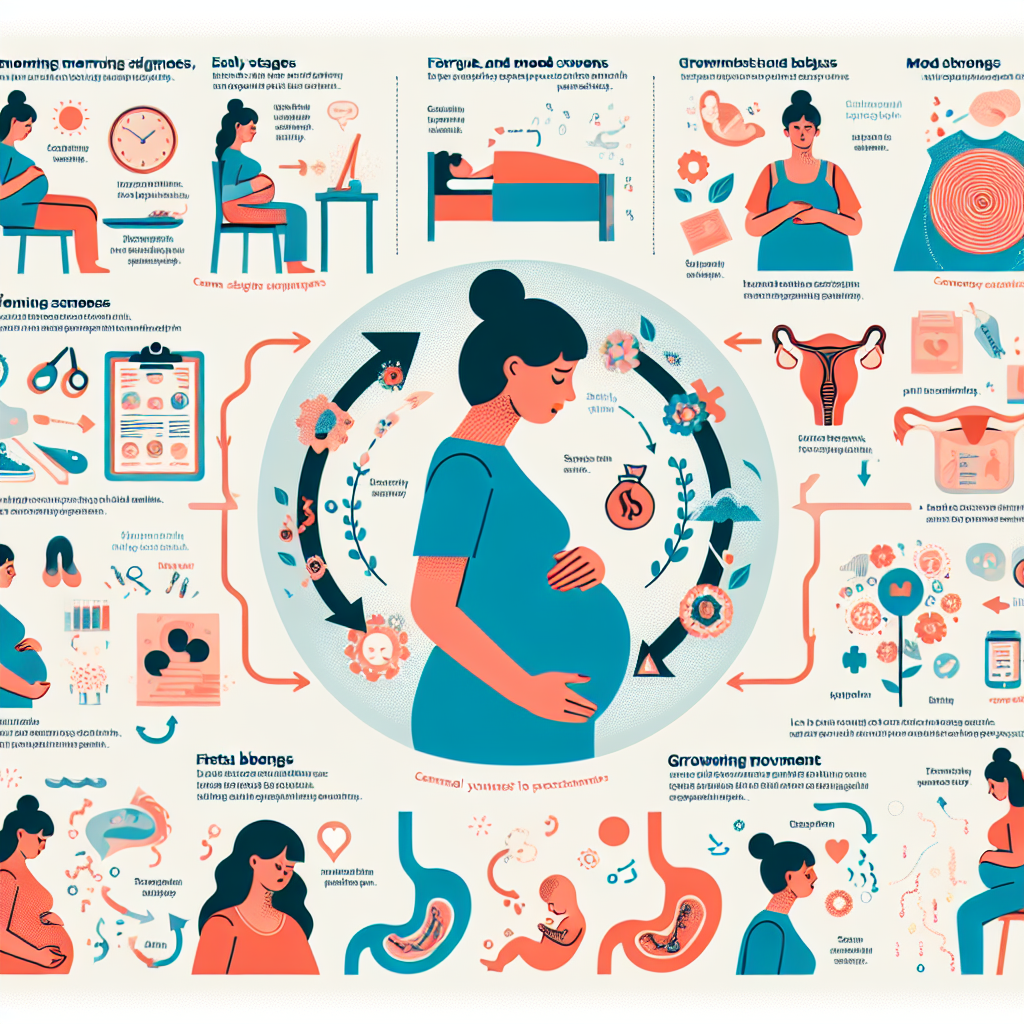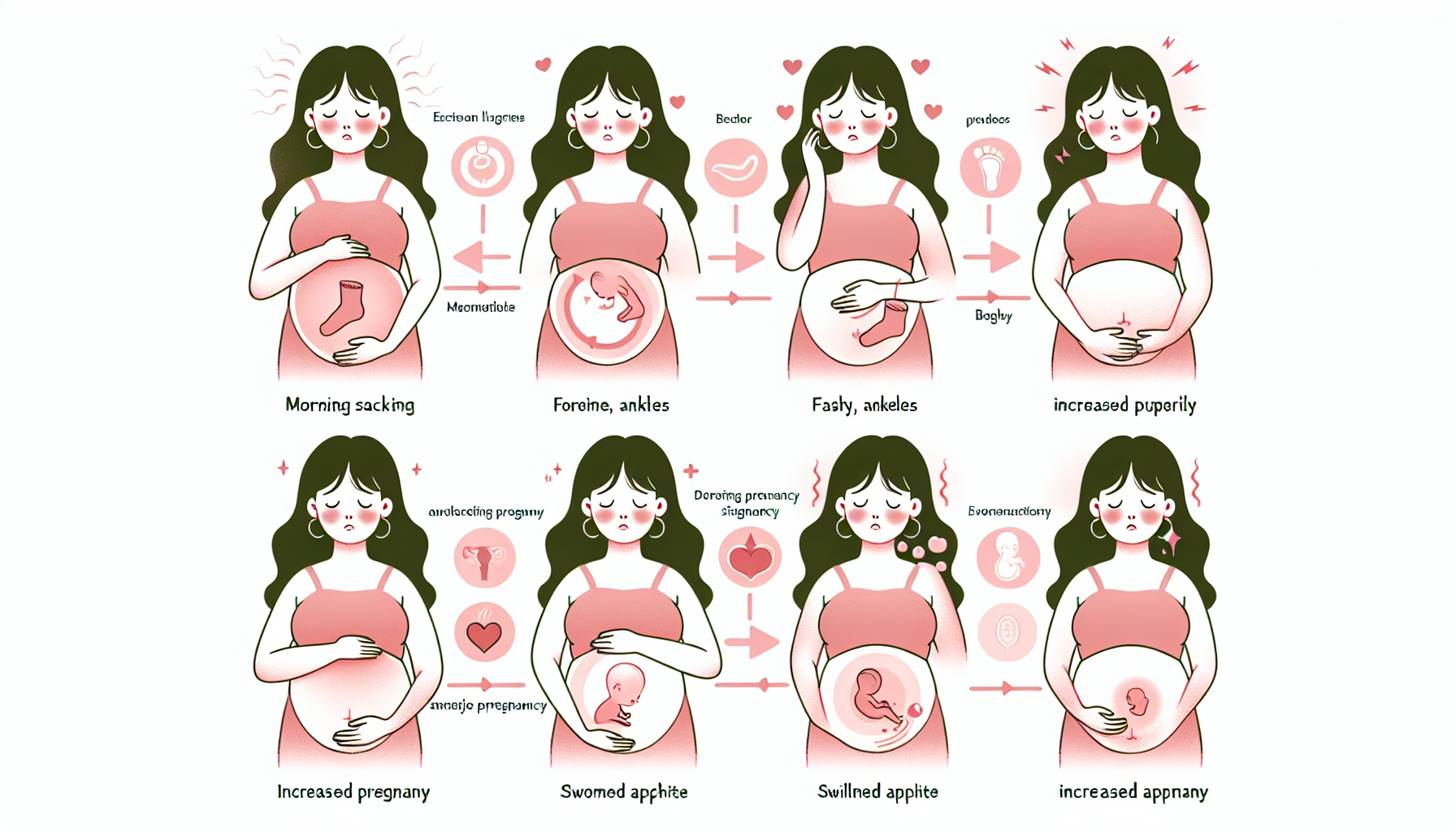Discover the common symptoms of pregnancy, from early signs to later stages. Learn how to recognize the key indicators and what changes to expect.
The moment a woman suspects she might be pregnant, the natural instinct is to look out for early symptoms. Pregnancy brings many changes to the body, some subtle and others more pronounced. While a missed period is one of the most well-known signs, pregnancy symptoms can vary from woman to woman. In this guide, we’ll take a closer look at the common symptoms of pregnancy, when they typically start, and what to expect during each stage.
Understanding pregnancy symptoms is important for women who are trying to conceive, those who suspect they might be pregnant, or even those who are newly pregnant and navigating this exciting time. Let’s explore the key signs and symptoms associated with pregnancy, and how you can recognize these changes early on.

Early Symptoms of Pregnancy
1. Missed Period
For most women, the first clear indication of pregnancy is a missed period. This is typically the most reliable early symptom, especially if you have a regular menstrual cycle. When a period is missed, it usually means that ovulation and fertilization have occurred, and the body has started producing the hormone hCG, which helps sustain the pregnancy.
- Why It Happens: A missed period occurs because the body halts the normal cycle of ovulation and menstruation once a fertilized egg has implanted in the uterus.
- When It Happens: Generally, a missed period is noticed about four weeks after conception, though this can vary based on cycle length.
2. Nausea and Morning Sickness
Morning sickness is one of the most notorious symptoms of early pregnancy, though it doesn’t affect everyone in the same way. Nausea can strike at any time of day, not just in the morning. This symptom is often linked to rising hCG and estrogen levels in the body.
- Why It Happens: Hormonal changes, particularly increased levels of hCG and estrogen, are believed to trigger feelings of nausea.
- When It Happens: Nausea typically starts between the 4th and 6th weeks of pregnancy and can last throughout the first trimester.
3. Breast Tenderness
Changes in your breasts are often one of the earliest signs of pregnancy. Many women report their breasts feeling fuller, more sensitive, or even slightly painful. This tenderness is caused by the hormonal shifts taking place in preparation for breastfeeding.
- Why It Happens: Increased levels of estrogen and progesterone cause blood flow to the breast tissue, making them more sensitive.
- When It Happens: Breast tenderness can begin as early as two weeks after conception.
4. Fatigue
Pregnancy is physically demanding, even in the early stages, and many women experience significant fatigue. This symptom is caused by the body working overtime to support the growth and development of the baby.
- Why It Happens: Elevated levels of the hormone progesterone contribute to fatigue by relaxing the muscles and making women feel more tired.
- When It Happens: Fatigue can start as early as the first week of pregnancy and may continue throughout the first trimester.
Other Common Symptoms of Pregnancy

5. Frequent Urination
The need to urinate more often than usual is another common symptom of pregnancy. This occurs because the growing uterus begins to put pressure on the bladder, and hormonal changes increase blood flow to the kidneys, causing the bladder to fill more frequently.
- Why It Happens: The body produces more fluids, and the uterus enlarges, placing extra pressure on the bladder.
- When It Happens: Frequent urination often begins around the 6th to 8th week of pregnancy.
6. Food Aversions and Cravings
Many pregnant women experience strong food aversions or cravings. Certain smells or tastes may become unappealing, while others may be highly desirable. These changes are believed to be linked to hormonal shifts.
- Why It Happens: Hormonal changes affect your sense of smell and taste, leading to unusual food preferences or aversions.
- When It Happens: Food cravings and aversions can start as early as the first trimester.
7. Bloating and Constipation
The hormonal changes of pregnancy can slow down the digestive system, leading to bloating, constipation, and discomfort. Increased progesterone levels relax the muscles in the digestive tract, which can cause food to move more slowly.
- Why It Happens: Progesterone relaxes the smooth muscles in the body, including the digestive system, which can lead to slower digestion.
- When It Happens: Bloating and constipation may appear early in pregnancy and continue throughout.
8. Mood Swings
Pregnancy hormones can have a significant impact on your mood, causing feelings of happiness, irritability, or sadness to fluctuate rapidly. Mood swings are common during pregnancy due to the surges in estrogen and progesterone levels.
- Why It Happens: Emotional changes are caused by fluctuating hormone levels that affect neurotransmitters in the brain.
- When It Happens: Mood swings can start as early as the first few weeks of pregnancy.
Symptoms in the Later Stages of Pregnancy
As pregnancy progresses, additional symptoms may develop, reflecting the growing baby and changing body. These symptoms can vary from woman to woman and are usually most prominent during the second and third trimesters.
9. Back Pain
As the baby grows, the weight of the uterus puts strain on the back and pelvis, which can cause discomfort. Many women experience lower back pain, especially as they approach the third trimester.
- Why It Happens: The expanding uterus shifts your center of gravity and puts strain on your back muscles.
- When It Happens: Back pain is most common in the later stages of pregnancy, though some women experience it earlier.
10. Shortness of Breath
As your uterus expands, it may press against your diaphragm, making it harder to breathe deeply. This can lead to shortness of breath, especially in the third trimester.
- Why It Happens: The growing uterus takes up more space in the abdomen, limiting the ability to fully expand the lungs.
- When It Happens: Shortness of breath is more common in the later stages of pregnancy, though it may be noticed earlier as well.
Internal Links for Further Reading
For more information on pregnancy-related topics, explore these internal resources:
- Pregnancy Symptoms: Find a comprehensive guide on early pregnancy symptoms and what they mean.
- Pregnancy Testing: Learn about the best times to take a pregnancy test and how to ensure accurate results.
- Postpartum Care: Understand what to expect during the postpartum period and how to care for your body after childbirth.
External Links for Additional Support
For more insights and expert advice, check out these trusted external resources:
- WebMD – Pregnancy Symptoms: Discover more about the common symptoms of pregnancy and how to manage them (WebMD).
- American Pregnancy Association: Learn about early pregnancy symptoms and what to expect during the first trimester (American Pregnancy Association).
- Mayo Clinic – Pregnancy Symptoms: Find comprehensive information on pregnancy symptoms and when to consult a doctor (Mayo Clinic).
Conclusion
Pregnancy symptoms vary from woman to woman and can present themselves at different times during the pregnancy journey. From early signs such as nausea and breast tenderness to later-stage symptoms like back pain and shortness of breath, each experience is unique. While a missed period is the most obvious early indicator, it’s important to pay attention to other subtle changes in your body.
If you’re experiencing multiple pregnancy symptoms and suspect you may be pregnant, taking a pregnancy test and consulting with a healthcare provider is the next best step. Understanding your body and the symptoms it presents can help you better prepare for the exciting changes that lie ahead.
Recognizing pregnancy symptoms early on is important not only for planning but also for ensuring that you’re taking the best care of yourself and your developing baby. Whether you’re in the early stages or moving into the second or third trimester, being informed about these key changes will help you navigate the beautiful journey of pregnancy with confidence.